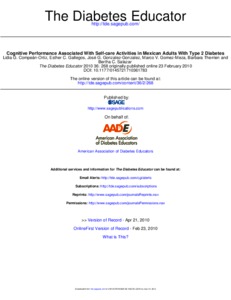Cognitive performance associated with self-care activities in mexican adults with type 2 diabetes
Compeán Ortiz, Lidia Guadalupe y Gallegos Cabriales, Esther Carlota y González González, José Gerardo y Gómez Meza, Marco Vinicio y Therrien, Barbara y Salazar González, Bertha Cecilia
(2010)
Cognitive performance associated with self-care activities in mexican adults with type 2 diabetes.
Revista Diabetes Educator, 36 (2).
pp. 268-275.
ISSN 0145-7217
![[img]](http://eprints.uanl.mx/2096/1.hassmallThumbnailVersion/Cognitive_Performance_Associated_With_Self-care_Activities_in_Mexican_Adults_With_Type_2_Diabetes.pdf)  Vista previa |
|
PDF
Cognitive_Performance_Associated_With_Self-care_Activities_in_Mexican_Adults_With_Type_2_Diabetes.pdf
- Versión Publicada
Download (231kB)
| Vista previa
|
Resumen
The purpose of this study was to determine the effect of memory-learning on self-care activities in adults with type 2 diabetes moderated by previous education/understanding in diabetes and to explore the explicative capacity of age, gender, schooling, diabetes duration, and glycemic control in memory-learning. METHODS: A descriptive correlational study was conducted in a randomized sample of 105 Mexican adult patients with type 2 diabetes at a community-based outpatient clinic. Evaluation measures included the Wechsler Memory Scale for memory-learning; 2 questionnaires for self-care activities and previous education/understanding in diabetes, respectively; and glycosylated hemoglobin for glycemic control. Multiple linear regression analysis was used to examine the effect of memory-learning on self-care activities and the moderator capacity of previous education/understanding on diabetes. Multivariate analysis was used to identify the capacity of age, schooling, diabetes duration, and glycemic control in memory-learning types. RESULTS: A significant positive effect of memory-learning on self-care activities was found. Education/understanding in diabetes moderated the relationship between immediate and delayed memory-learning and self-care in glucose monitoring and diet. Gender, schooling, and the gender-glycemic control interaction explained memory-learning performance. CONCLUSIONS: Immediate and delayed verbal and visual memory-learning were important for the patient to carry out self-care activities, and this relationship can be moderated by previous education/understanding in diabetes. These findings suggest potential benefits in emphasizing cognitive strategies to promote relearning of self-care behaviors in persons who live with diabetes.
| Tipo de elemento: |
Article
|
| Materias: |
R Medicina > RT Enfermería |
| Divisiones: |
Enfermería |
| Usuario depositante: |
Admin Eprints
|
| Creadores: |
| Creador | Email | ORCID |
|---|
| Compeán Ortiz, Lidia Guadalupe | lcompean@uat.edu.mx | NO ESPECIFICADO | | Gallegos Cabriales, Esther Carlota | esther.gallegoscb@uanl.edu.mx |  orcid.org/0000-0003-3619-2596 orcid.org/0000-0003-3619-2596 | | González González, José Gerardo | NO ESPECIFICADO | NO ESPECIFICADO | | Gómez Meza, Marco Vinicio | NO ESPECIFICADO | NO ESPECIFICADO | | Therrien, Barbara | NO ESPECIFICADO | NO ESPECIFICADO | | Salazar González, Bertha Cecilia | NO ESPECIFICADO | NO ESPECIFICADO |
|
| Fecha del depósito: |
10 Jun 2013 17:50 |
| Última modificación: |
04 Mar 2024 16:26 |
| URI: |
http://eprints.uanl.mx/id/eprint/2096 |
Actions (login required)
 |
Ver elemento |


 orcid.org/0000-0003-3619-2596
orcid.org/0000-0003-3619-2596 Descargar estadísticas
Descargar estadísticas Descargar estadísticas
Descargar estadísticas

